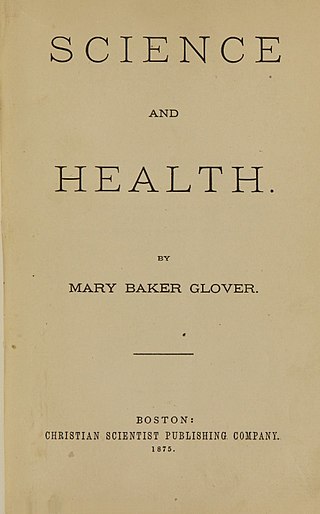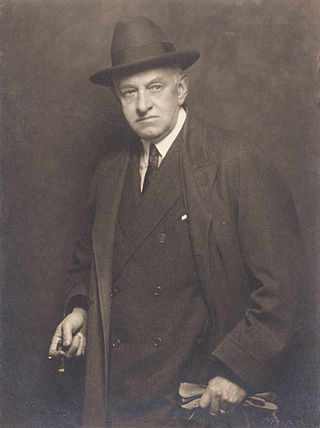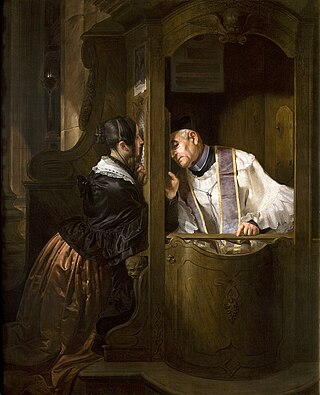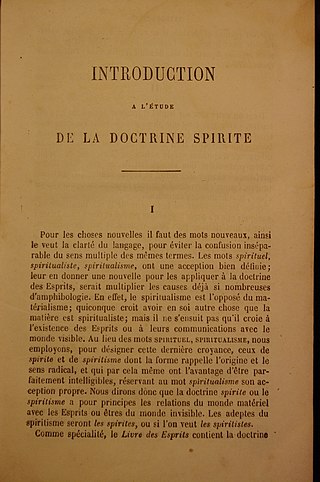
Karma is a concept of action, work, or deed, and its effect or consequences. In Indian religions, the term more specifically refers to a principle of cause and effect, often descriptively called the principle of karma, wherein individuals' intent and actions (cause) influence their future (effect): Good intent and good deeds contribute to good karma and happier rebirths, while bad intent and bad deeds contribute to bad karma and bad rebirths. In some scriptures, however, there is no link between rebirth and karma. Karma is often misunderstood as fate, destiny, or predetermination.
The Book of Mosiah is one of the books which make up the Book of Mormon. The title refers to Mosiah II, a king of the Nephites at Zarahemla. The book covers the time period between ca 130 BC and 91 BC, except for when the book has a flashback into the Record of Zeniff, which starts at ca 200 BC, according to footnotes. Aside from stating that it was abridged by Mormon, the text says nothing about its authorship. Mosiah is twenty-nine chapters long.

Science and Health with Key to the Scriptures by Mary Baker Eddy is, along with the Bible, one of the two central texts of the Christian Science religion. Eddy described it as her "most important work". She began writing it in February 1872, and the first edition was published in 1875. However, she would continue working on it and making changes for the rest of her life.

Confession, in many religions, is the acknowledgment of sinful thoughts and actions. This may occur directly to a god or to fellow people.

In Christianity, salvation is the saving of human beings from sin and its consequences—which include death and separation from God—by Christ's death and resurrection, and the justification entailed by this salvation.
Ernest Shurtleff Holmes was an American New Thought writer, teacher, and leader. He was the founder of a spiritual movement known as Religious Science, part of the greater New Thought movement, whose spiritual philosophy is known as "The Science of Mind." He was the author of The Science of Mind and numerous other metaphysical books, and the founder of Science of Mind magazine, in continuous publication since 1927. His books remain in print, and the principles he taught as "Science of Mind" have inspired and influenced many generations of metaphysical students and teachers. Holmes had previously studied another New Thought teaching, Divine Science, and was an ordained Divine Science Minister. His influence beyond New Thought can be seen in the self-help movement.

Willard Leroy Metcalf was an American painter born in Lowell, Massachusetts. He studied at the School of the Museum of Fine Arts, Boston, and later attended Académie Julian, Paris. After early figure-painting and illustration, he became prominent as a landscape painter. He was one of the Ten American Painters who in 1897 seceded from the Society of American Artists. For some years he was an instructor in the Women's Art School, Cooper Union, New York, and in the Art Students League, New York. In 1893 he became a member of the American Watercolor Society, New York. Generally associated with American Impressionism, he is also remembered for his New England landscapes and involvement with the Old Lyme Art Colony at Old Lyme, Connecticut and his influential years at the Cornish Art Colony.
The New Covenant is a biblical interpretation which was originally derived from a phrase which is contained in the Book of Jeremiah, in the Hebrew Bible.
In Christian hamartiology, eternal sin, the unforgivable sin, unpardonable sin, or ultimate sin is the sin which will not be forgiven by God. One eternal or unforgivable sin, also known as the sin unto death, is specified in several passages of the Synoptic Gospels, including Mark 3:28–29, Matthew 12:31–32, and Luke 12:10, as well as other New Testament passages including Hebrews 6:4–6, Hebrews 10:26–31, and 1 John 5:16.

Absolution is a theological term for the forgiveness imparted by ordained Christian priests and experienced by Christian penitents. It is a universal feature of the historic churches of Christendom, although the theology and the practice of absolution vary between Christian denominations.
Louise Lynn Hay was an American motivational author, professional speaker and AIDS advocate. She authored several New Thought self-help books, including the 1984 book You Can Heal Your Life, and founded Hay House publishing.

The Spirits' Book is part of the Spiritist Codification, and is regarded as one of the five fundamental works on Spiritism. It was published by the French educator Hippolyte Léon Denizard Rivail, under the pen name of Allan Kardec on April 18, 1857. It was the first and remains the most important Spiritist book, because it addresses in first hand all questions developed subsequently by Allan Kardec.

Matthew 7:12 is the twelfth verse of the seventh chapter of the Gospel of Matthew in the New Testament and is part of the Sermon on the Mount. This well known verse presents what has become known as the Golden Rule.

Matthew 9:6 is the sixth verse in the ninth chapter of the Gospel of Matthew in the New Testament.

Matthew 11:7 is the seventh verse in the eleventh chapter of the Gospel of Matthew in the New Testament.

Matthew 12:12 is the twelfth verse in the twelfth chapter of the Gospel of Matthew in the New Testament.

Florence Scovel Shinn was an American artist and book illustrator who became a New Thought spiritual teacher and metaphysical writer in her middle years.

Christian universalism was a theology prevalent in the early United States coinciding with the founding of the Latter Day Saint movement in 1830. Universalists believed that God would save all of humanity. Universalism peaked in popularity during the 1820s and 1830s, and the idea of universal salvation for all humanity was hotly debated. Several revelations of the founder of the Latter Day Saint movement, Joseph Smith, dealt with issues regarding Universalism, and it was a prominent heresy in the Book of Mormon. Smith's father was a Universalist, while his mother was a traditional Calvinist, creating strain in the Smith family home.
Matthew 12:31-32 are two verses in the twelfth chapter of the Gospel of Matthew in the New Testament.

Matthew 15:3-6 is a set of verses in the fifteenth chapter of the Gospel of Matthew in the New Testament.














